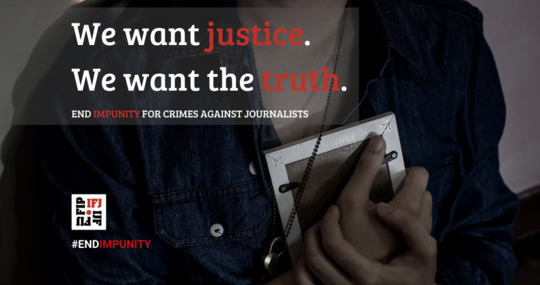According to IFJ statistics, more than 35 journalists have been killed this year in the course of their duty - some of whom were hit by bomb blasts, others were killed in cold blood.
On social media, journalists, especially women and those who represent ethnic or racial minorities or LGBTQIA+, are subject to destructive campaigns in an attempt to muzzle them. Death threats, rape threats, doxxing, racist abuse, impersonation have led many journalists to silence themselves, not to mention the psychological damage such attacks leave on the targeted reporter.
Across the globe journalists are regularly attacked while reporting in the field, their equipment is destroyed, their families are threatened. Investigative journalists usually pay the highest price for uncovering money laundering and large scale corruption.
Only 1 out of every 10 journalists' killing is subject to a proper investigation.
This year's IFJ campaign will focus in particular on Afghanistan, Kosovo, Mexico, Somalia and Yemen - countries which have shown a deplorable lack of will to investigate attacks on media workers.
In Afghanistan, 2021 has been the most devastating year for journalists in living memory. As the Taliban’s new regime consolidates power, journalists and media workers have been directly targeted, from the capital Kabul to the border regions, caught in the crossfire and deliberately assassinated. Between 2010 and 2021, 87 Afghan journalists have been killed in the course of their duties, and in 2021 alone, 13 journalists and media workers have lost their lives. Only 5 of these cases have been resolved, and, under Taliban rule, the remainder are unlikely to ever be given the justice they are owed despite the militant group’s insincere assurances to uphold press freedom.
In Kosovo, 19 out of the 20 Serbian and Albanians journalists' who disappeared in the aftermath of the Balkan war remain unresolved. In addition 2021 has seen an escalation of attacks against media workers and the country has one of the highest rates of impunity in Europe.
Mexico remains one of the most dangerous countries in the world for journalists. Fifteen years after the country’s military joined the war on drugs, crimes against Mexican press workers and their disappearances are emblematic of the systemic violence which has flowed from it. The IFJ has already documented 7 killings in 2021 and the level of impunity in the country amounts to 95%.
Somalia continues to be one of the most dangerous countries for journalists in Africa. State officials and a corrupt judiciary system have been a serious obstacle to press freedom, while journalists were killed in crossfire, bombings, terrorist attacks or in targeted attacks. Since 2010, 58 journalists have been killed, with the deadliest year being 2012 with 18 killings. The level of impunity remains unacceptably high as only 4 killers have been punished to date. In 2021 alone, the IFJ has registered 20 serious cases of crimes against journalists, including the killing of a journalist in the Puntland region
In Yemen 44 journalists were killed between 2011 and September 2021. According to the IFJ affiliate the Yemeni Journalists Syndicate (YJS), none of the perpetrators has been brought to justice. The absence of an independent judiciary and inadequate security conditions have made the death toll and the conditions to report even more difficult and arbitrary detentions, injuries and threats continue to occur on a daily basis.
IFJ President Younes MJahed said: "It is time to put an end to judicial negligence, abusive legislation and governments' blindness. A society that leaves journalists' killers and harassers to walk free is not a democracy. In the name of our colleagues and friends who have been attacked, threatened or killed, of their loved ones who are powerless witnesses of the deliberate muzzling of journalists, in the name of media freedom and the public's right to know, we want justice now. And we want the truth."
To join the IFJ impunity campaign and help hold governments to account, click here

